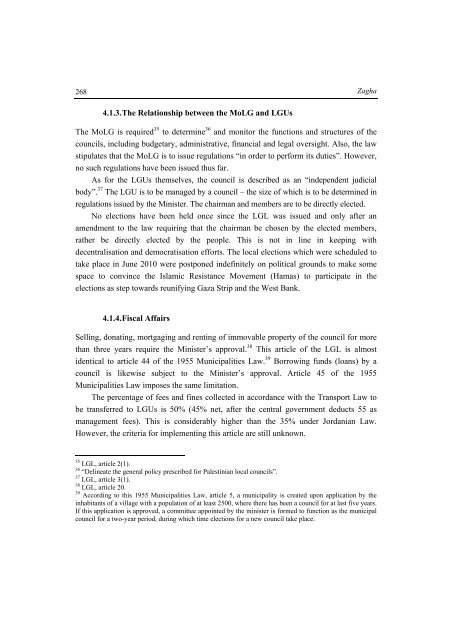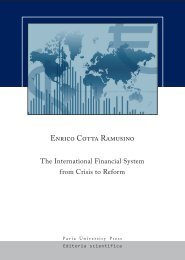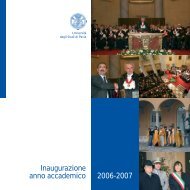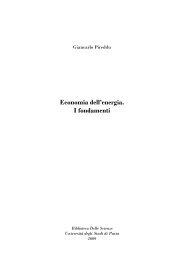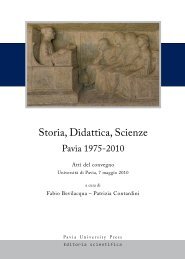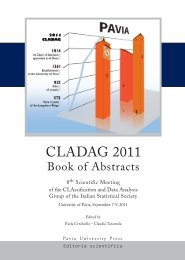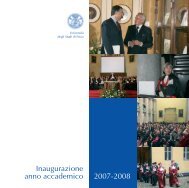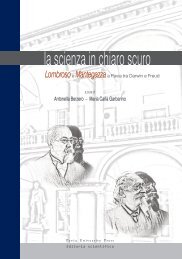The Palestinian Economy. Theoretical and Practical Challenges
The Palestinian Economy. Theoretical and Practical Challenges
The Palestinian Economy. Theoretical and Practical Challenges
You also want an ePaper? Increase the reach of your titles
YUMPU automatically turns print PDFs into web optimized ePapers that Google loves.
268<br />
Zagha<br />
4.1.3. <strong>The</strong> Relationship between the MoLG <strong>and</strong> LGUs<br />
<strong>The</strong> MoLG is required 35 to determine 36 <strong>and</strong> monitor the functions <strong>and</strong> structures of the<br />
councils, including budgetary, administrative, financial <strong>and</strong> legal oversight. Also, the law<br />
stipulates that the MoLG is to issue regulations “in order to perform its duties”. However,<br />
no such regulations have been issued thus far.<br />
As for the LGUs themselves, the council is described as an “independent judicial<br />
body”. 37 <strong>The</strong> LGU is to be managed by a council – the size of which is to be determined in<br />
regulations issued by the Minister. <strong>The</strong> chairman <strong>and</strong> members are to be directly elected.<br />
No elections have been held once since the LGL was issued <strong>and</strong> only after an<br />
amendment to the law requiring that the chairman be chosen by the elected members,<br />
rather be directly elected by the people. This is not in line in keeping with<br />
decentralisation <strong>and</strong> democratisation efforts. <strong>The</strong> local elections which were scheduled to<br />
take place in June 2010 were postponed indefinitely on political grounds to make some<br />
space to convince the Islamic Resistance Movement (Hamas) to participate in the<br />
elections as step towards reunifying Gaza Strip <strong>and</strong> the West Bank.<br />
4.1.4. Fiscal Affairs<br />
Selling, donating, mortgaging <strong>and</strong> renting of immovable property of the council for more<br />
than three years require the Minister’s approval. 38 This article of the LGL is almost<br />
identical to article 44 of the 1955 Municipalities Law. 39 Borrowing funds (loans) by a<br />
council is likewise subject to the Minister’s approval. Article 45 of the 1955<br />
Municipalities Law imposes the same limitation.<br />
<strong>The</strong> percentage of fees <strong>and</strong> fines collected in accordance with the Transport Law to<br />
be transferred to LGUs is 50% (45% net, after the central government deducts 55 as<br />
management fees). This is considerably higher than the 35% under Jordanian Law.<br />
However, the criteria for implementing this article are still unknown.<br />
35 LGL, article 2(1).<br />
36 “Delineate the general policy prescribed for <strong>Palestinian</strong> local councils”.<br />
37 LGL, article 3(1).<br />
38 LGL, article 20.<br />
39 According to this 1955 Municipalities Law, article 5, a municipality is created upon application by the<br />
inhabitants of a village with a population of at least 2500, where there has been a council for at last five years.<br />
If this application is approved, a committee appointed by the minister is formed to function as the municipal<br />
council for a two-year period, during which time elections for a new council take place.


